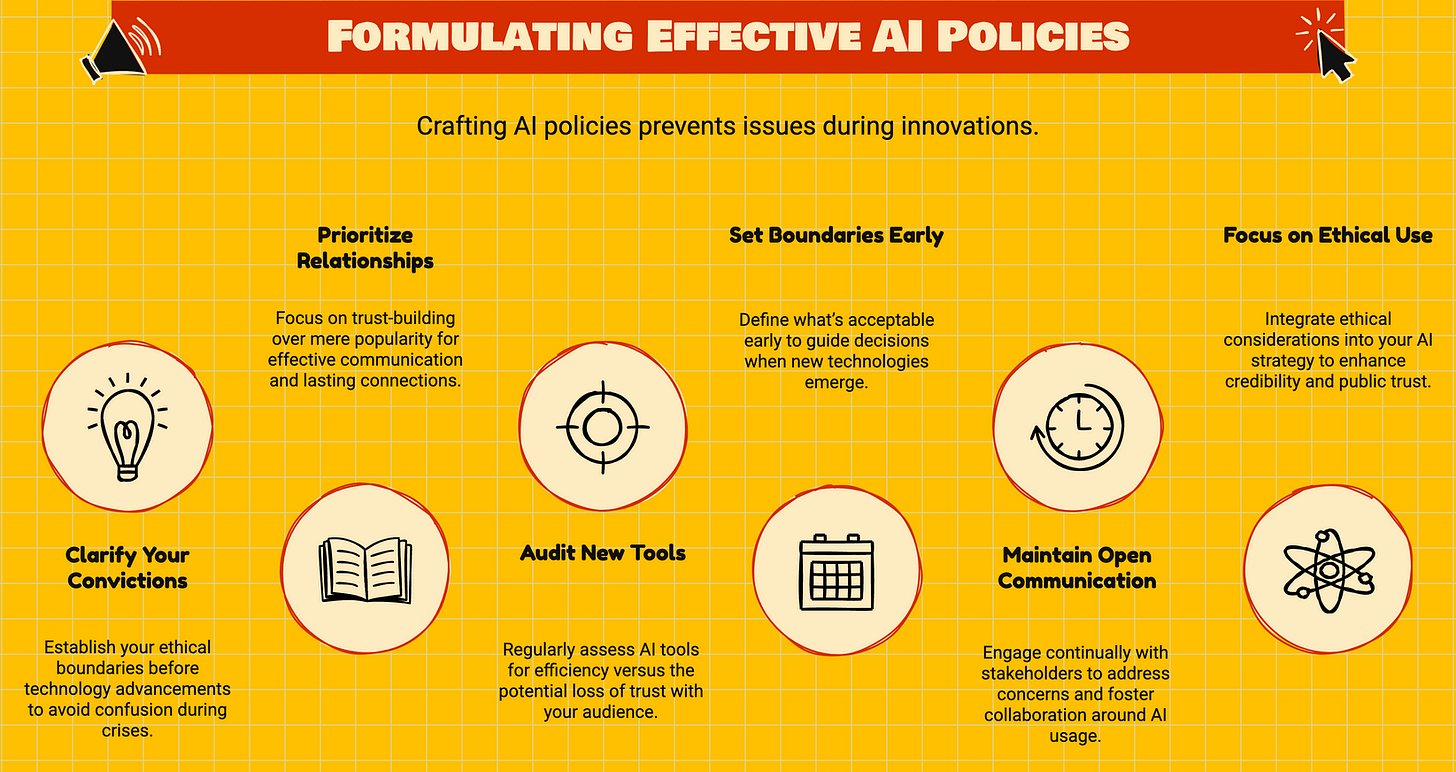The Real Cost of Fake Power
What AI controversy reveals about the future of trustworthy leadership
Leadership without ethical restraint doesn’t innovate. It deteriorates.
This week, the leadership world collided with controversy.
Just days after Pope Francis was laid to rest, former President Donald Trump shared an AI-generated image of himself dressed as the Pope. The post, though likely intended as a joke, landed poorly. It sparked outrage across political, religious, and international communities.
Cardinal Timothy Dolan and the New York State Catholic Conference condemned it. Former Italian Prime Minister Matteo Renzi called it a disgrace. Even Republican strategist Karl Rove publicly questioned the decision.
The post wasn’t just a PR misstep. It raised deeper questions about where leadership is going in a digital age. Specifically, how far is too far when it comes to using powerful technology to shape public perception?
The Trump-AI moment became a warning for every leader navigating a world of deepfakes, fast content, and shrinking ethical attention spans.
This moment isn’t just about politics, technology, or even public backlash. It’s a window into something every leader is going to face in the coming years: what do we do when we have the power to create anything… but lack the pause to ask whether we should?
That’s not a tech problem. That’s a wisdom problem.
It’s easy to justify decisions based on what’s permissible, especially in a world moving at digital speed. But spiritual leadership, and trusted influence for that matter, demands more than permission. It requires discernment.
That’s why Paul’s words to the Corinthians have never felt more relevant.
"Everything is permissible for me, but not everything is beneficial."
— 1 Corinthians 10:23 (NIV)
Paul wasn’t talking about technology, but the principle applies. In Corinth, the church was trying to figure out how to live faithfully in a culture where everything was accessible but not always appropriate. He reminded them: just because you can doesn’t mean you should.
That’s the tension leaders are navigating now. AI gives us remarkable creative tools. But when leaders use them without boundaries, they risk losing the very thing leadership depends on…trust.
Leadership Without Boundaries Is Always a Risky Play
In the age of digital everything, leadership isn't just about what you say. Today, it's about what you allow. Technology has opened new doors, but it’s also erased old fences. If you can create content faster, reach people further, and stir emotion instantly, that means one thing: your influence can now outpace your integrity if you’re not careful.
The Trump-AI image wasn’t dangerous because it was technologically advanced. It was dangerous because it was boundaryless. It ignored sacred timing, minimized spiritual context, and treated leadership like a meme machine. That’s not just a problem for politics. It’s a red flag for every leader across every sector.
Leadership without ethical restraint doesn’t innovate. It deteriorates.
The most trusted leaders understand they must operate inside boundaries they created in advance. They know that just because you can post something, doesn’t mean you should. Just because the tool is available doesn’t make the timing appropriate.
That’s the mistake too many leaders make with new technology. They confuse access for wisdom and forget that the method often impacts the message more than they realize. If you use a manipulative tool to carry something meaningful, the tool always taints the message.
Speed without discernment always ends in regret. REMEMBER THAT…
Culture Always Imitates Its Leaders
One of the hardest truths in leadership is this: You don’t just set direction—you shape culture.
When a prominent leader posts something tone-deaf or self-serving, it sends a message. Not just to followers, but to teams, communities, and younger leaders who are still learning what “influence” actually means within the organization and the community. If that leader seems to get rewarded for being reckless, it doesn’t take long for others to follow suit.
People don’t copy what leaders say. They copy what leaders tolerate.
When culture erodes, it rarely starts with bad people. It starts with unclear standards. If there’s no visible line for what’s acceptable, then attention becomes the only metric. And once attention replaces values as the goal, credibility becomes the casualty.
That’s why the greatest gift you can give your team is the gift of clarity. Not just in vision, but in how you want to show up. If you’re building something that lasts, you must model what long-term trust looks like in real time, even when it’s slower, less glamorous, or harder to measure.
Here’s a leadership question worth revisiting: If my team copied my tone, posture, and behavior today, would our culture be healthier or more fractured in a month?
Not Everything Authentic Comes Quickly
There’s a subtle lie floating around leadership circles: “If you’re not moving fast, you’re falling behind.” And while urgency can be healthy, spiritual leadership doesn’t thrive on speed. It thrives on substance. (that one felt good even to just type out…).
What makes you trustworthy will always be based on how much weight your words carry when you speak. And that weight is built slowly.
AI can mimic tone. It can scale messaging. It can save time. But it cannot create depth, discernment, or presence. Those qualities are cultivated within tolerance, not automation. They come from experience, mess-ups, reflection, hard conversations, and spiritual growth. And the moment we start exchanging authentic connection for automated production, we begin to hollow out the core of real leadership.
People can tell when something’s been microwaved. They’re hungry for something slow-roasted.
There’s nothing wrong with leveraging tools. But the most respected leaders don’t sacrifice depth to gain speed. They understand that what’s most powerful often takes time to say the right way.
Respect Is Still the Foundation of Influence
This should be obvious, but in the AI arms race, it’s worth restating: You can’t lead people well if you don’t respect them deeply.
True influence is built on a foundation of honor.
That means honoring people’s values, their sacred moments, their history, and their pain. When leaders treat deep spiritual or emotional moments like props for platform growth, they absolutely demolish trust within that community.
What made the AI Pope image so offensive wasn’t the creativity as much as it was the timing. A spiritual giant had just passed. A global faith community was grieving. And rather than honor the moment, it was leveraged for attention. And it ended in insensitivity disguised as relevance.
This principle is transferable to every field.
In education: A principal who mocks their staff won’t earn their respect.
In business: A CEO who disregards their customers’ lived experience can’t expect loyalty.
In the Church: A pastor who minimizes a cultural wound in the name of being “clever” loses credibility, not gains it.
When respect goes missing, influence disappears soon after.
Building a Personal and Organizational AI Policy
So, let’s talk about how we don’t put ourselves into this avoidable situation. And don’t disregard that last line…it’s AVOIDABLE. Here’s how to make sure you don’t repeat the mistake others are now paying for:
1. Clarify your convictions.
Before the next innovation drops, know what lines you won’t cross. Don’t wait until you’re under pressure to decide what matters.
2. Put relationships before reach.
Your goal isn’t just to go viral. It’s to serve well. That only happens when your communication builds trust, not just momentum.
3. Audit how you’re using new tools.
AI can help create efficiency. But check for overreach. If your audience knew how that content was created, would it increase respect or raise questions?
You don’t need to fear AI. But you do need to lead it.
And leading it means staying rooted in the values that got you here.
The future won’t belong to those with the flashiest tools. It will belong to those who kept their character while others lost their compass.
Leaders who slow down, listen first, and build policies rooted in honor will outlast those chasing fast wins.
Be smart…



